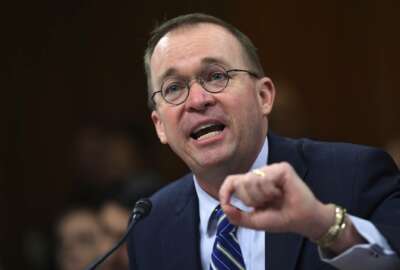
Mnuchin: IRS funding needed to implement tax law, improve customer service
Treasury Secretary Steve Mnuchin stressed the importance of giving the IRS nearly $400 million annually for fiscal years 2018 and 2019 to help implement the Tax...
Following a Trump administration budget request that would cut Internal Revenue Service cybersecurity enhancement funding nearly in half and cut thousands of jobs from taxpayer services, Treasury Secretary Steve Mnuchin urged House lawmakers Tuesday to give the agency an extra funding boost to help implement the president’s new tax reform law.
Testifying before a subcommittee of the House Appropriations Committee, Mnuchin stressed the importance of giving the IRS nearly $400 million annually for fiscal years 2018 and 2019 to help implement the Tax Cuts and Jobs Act.
“It is one of my top priorities, making sure we implement the tax plan, which impacts literally everything at the IRS, from customer service, to forms, to technology. That’s what is so important that we get the additional funding for it,” Mnuchin said, adding that he now meets daily with a combined team of Treasury’s Office of Tax Policy and IRS leadership to discuss the implementation of tax reform.
Since 2010, Congress has cut the IRS budget by nearly $1 billion, and more than 17,000 employees have left the agency. In President Donald Trump’s fiscal 2019 budget request, the IRS would see another $100 million decrease in its overall funding.
“Look, there have been issues at the IRS in the past. We’ve tried to deal with these issues, but the vast majority of the workers at the IRS, I think, are incredibly hard-working,” Mnuchin said.
Nearly two-thirds of the tax reform funding supplemental, about $291 million, would be spent updating the IRS’ IT systems. Another $75 million would go to taxpayer services, a department the Trump administration seeks to shrink by 8.7 percent and 4,000 employees in FY 2019.
“A lot of it will go to service, some of it directly, where we’ll hire more people to answer the phones, particularly during the peak of tax filing season. A lot of it will go to technology that will help interact and everything else. … We have antiquated telephone systems. We want to modernize the technology so we can provide better customer service. We need to update all the forms to reflect the simpler ability to file. A lot of this money will help directly and indirectly,” Mnuchin said.
While the IRS expects to answer 75 percent of filing questions over the phone this year, the National Treasury Employees Union expects the level of phone service will drop to 47 percent in 2019 if Congress enacts the Trump budget proposal.
Acting IRS Commissioner David Kautter first made the case for additional funding to the Senate Finance Committee in February.
Rep. Mike Quigley (D-Ill.), the ranking member of the Financial Services and General Government Subcommittee, expressed doubts that a continuously shrinking IRS could effectively do its job, especially now that it’s received new responsibilities under the tax reform law.
“It is hard to imagine why this administration would want to weaken the IRS and give taxpayers less resources right after passing a complex tax bill,” Quigley said.
The ranking member also questioned why the Trump administration would cut cybersecurity enhancement funding nearly in half — down from $47.7 million in FY 2017 to $25.2 million in FY 2019 — especially at a time when the IRS stops nearly a million attempted cyber intrusions each day.
“Again, this year the Treasury budget before us would slash various programs that will make us less effective, less efficient and more vulnerable to outside risk,” he said.
Despite the cuts to funding, Mnuchin said he remains convinced that the Cybersecurity Enhancement Account has the resources it needs to continue operating.
“This initiative makes proactive and strategic investments in enterprise-wide cybersecurity capabilities. These capabilities will ensure that Treasury is better prepared to defend against cyber attacks and respond appropriately when such attacks occur,” he said.
In addition to keeping its own IT systems secure, the Treasury Department also helps protect banks and financial institutions from cyber attacks, particularly large-scale attacks sponsored by other nations. Looking ahead, Mnuchin said Treasury will seek increased funding to help prevent these cyber attacks.
“We’re constantly taking in lots of information from the banks — big data dumps to look at illicit activity. In regards to cyber, I’m not comfortable mentioning which countries specifically, but I’m pretty sure you know the highlighted ones, and we’re very focused on this,” Mnuchin said.
Copyright © 2025 Federal News Network. All rights reserved. This website is not intended for users located within the European Economic Area.
Jory Heckman is a reporter at Federal News Network covering U.S. Postal Service, IRS, big data and technology issues.
Follow @jheckmanWFED





